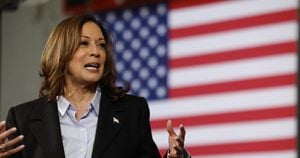The political scene in France is brewing with tension as the far-right party, Rassemblement National (RN), led by Marine Le Pen, threatens to bring down the government of Prime Minister Michel Barnier. This looming challenge to the government follows this summer's snap parliamentary elections, which saw no single party obtaining an outright majority. The RN emerged as the largest party, leaving Barnier's minority right-wing government precariously balanced.
On Monday, Sebastien Chenu, the deputy president of the RN, voiced the party's stance, claiming Barnier is "creating all the conditions for a no-confidence motion and is adding to them day by day." The RN is currently capitalizing on the government's frailties following the elections called by President Emmanuel Macron. The absence of clear leadership and unity among the parties has only deepened the political instability.
With the leftist bloc being the single largest coalition following the election, there are whispers of collaboration between the left and RN to topple Barnier's government. Analysts are observing this dynamic closely, describing it as a "sword of Damocles" hanging over the current administration. The precariousness has been heightened as the government considers employing controversial constitutional measures to advance budget legislation without parliamentary approval, increasing the likelihood of triggering the no-confidence motion.
Chenu contrasted the upcoming budget, which he denounced as detrimental to French citizens, asserting, "This budget will impact the French; we are not going to resolve anything, and it is, quite frankly, a very bad budget." He expressed his ambitions for the RN to proceed with the no-confidence motion, reaffirming his belief in the urgency of such action as the party eyes strategic advantages for future elections.
The stakes are particularly high for Le Pen, who is battling multiple fronts. She is currently undergoing trial for alleged corruption, including accusations of embezzling European public funds through fictitious jobs, alongside other RN members. Facing potential jail time and disqualification from presidential elections could severely affect her political future, forming another layer of complexity to the governing crisis.
"Prosecutors want my political death," Le Pen stated, underscoring the urgency with which she approaches her defense, portraying her trial as politically motivated. Although her trial has stirred discomfort among political circles, with some advocating for her to be defeated through democratically held elections rather than legal means, the underlying tensions continue to fester.
Young RN chief, Jordan Bardella, remains open to the legitimacy of the party's approach yet is aware of the risks involved. According to party insiders, there is hesitance over instigated chaos, with concerns about being left with blame for any ensuing political turbulence. "It's not something we are going to do for fun," remarked one RN official, adding, "Who would be the new prime minister? What would be different?"
All eyes are on the RN and the opposition as the government navigates its path forward, particularly with the Christmas break approaching. Could France find itself without stable governance by New Year? The political temperature is rising as negotiations intensify, but whether Barnier can withstand the impending storm remains uncertain.
Meanwhile, Le Pen is contemplating the long-term ramifications of her current legal struggles as she seeks her best chance yet for the presidency during the upcoming elections slated for 2027. The momentum of recent political developments plays directly to her favor and the RN, opening doors for her to frame the narrative around the government's weakness.
The future of France's political stability hangs by a thread, suspended between opportunities for the RN and challenges facing Barnier's government. The intricacies of this political chess game are shaping up to draw the interest of citizens across the country as factions align and realign.
While France confronts its political crossroads, the effects of this turbulence will likely shape public sentiment and electoral outcomes. Time will tell whether France can emerge from this period of uncertainty with a cohesive governance structure or if the far-right RN will fully capitalize on the current dysfunction.



